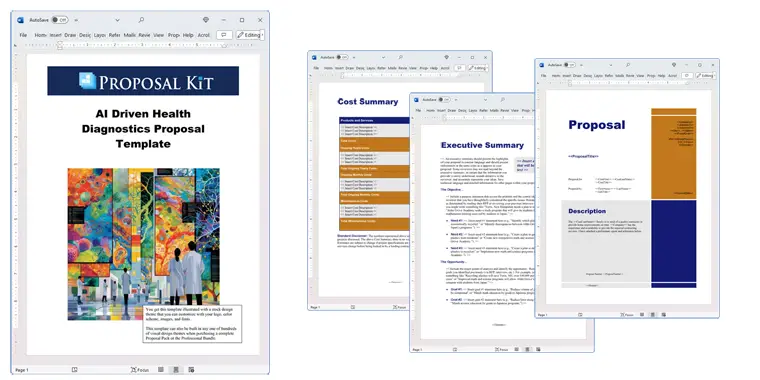How to write your AI Driven Health Diagnostics Proposal Template
We include this 21 page layout with every Proposal Pack. If you want this template to have a different visual design theme than the one illustrated here, purchase any Proposal Pack design and create this template using the purchased design theme. This template is included in every Proposal Pack. If you get a Proposal Pack or the Professional, you can also make any variation of this template with different chapters to suit your needs.
We typically include more chapters in the templates than most people will need to give everyone more variety in the chapters they may need. You can trim down a long template by removing pages you do not need or combining multiple chapter topics into one page.
 DOWNLOADABLE, ONE-TIME COST, NO SUBSCRIPTION FEES
DOWNLOADABLE, ONE-TIME COST, NO SUBSCRIPTION FEESYou can also create countless variations of this document to suit your needs using the included library of 2200+ chapters if ordering a Proposal Pack or Professional.
 What Our Clients Say
What Our Clients SayJust used one of your packs today and finished a business proposal in one day that would otherwise have taken me a week to do and the result was far more professional looking."
Related Article
Related Video
Related Templates
- AI for Elderly Care Proposal Template
- AI Predictive Maintenance Algorithm Patent Proposal Template
- AI Proposal Template
- Mobile App Software Development Proposal
- Cloud Computing Services Proposal
- AI Powered Domestic Manufacturing Proposal Template
- Artificial Intelligence Project Funding Proposal
- Artificial Intelligence Proposal Template
- Technology Strategy Analysis
- Software Beta Testing Project Proposal
- Software System Testing Project Proposal
- Software Automation Proposal
- Software and Hardware System Proposal
- Software as a Service (SAAS) Proposal
- Custom Software Development Proposal
- Defense Contracting Intelligence System Proposal
- AI For Mental Health Support Proposal Template
What's the best way to write your AI-driven health diagnostics proposal?
Writing an AI-powered health diagnostics proposal is now straightforward and efficient with the Proposal Kit template library and software. Proposal Kit is a proven solution trusted by businesses worldwide for creating persuasive, customized proposals. The software includes not only an extensive library of templates tailored to healthcare technology and artificial intelligence initiatives but also a line item quoting database for building detailed cost summaries, estimates, and budgets. Even better, its integrated AI writer creates personalized first drafts tailored to your specific project in just minutes, saving you hours of effort. You can take your completed proposal and instantly convert it into a PowerPoint slideshow using Proposal Kit's AI-powered feature - perfect for impactful presentations.
If you are in the healthcare technology sector and need to demonstrate your AI solution's value for early disease detection, or if your organization must present a detailed plan for integrating artificial intelligence into diagnostic workflows, Proposal Kit is made for you. Its combination of customizable templates, automated quoting, and AI-driven writing assistance ensures your proposal is clear, convincing, and ready to win business.
What Types of Projects Are AI-Driven Health Diagnostics Proposal Written For?
Proposals for AI-based health diagnostics solutions are written for a wide range of healthcare and technology projects. These proposals help organizations communicate the value, methodology, and financial topics of integrating artificial intelligence into healthcare systems. Here are examples of the types of projects that typically need such proposals:
- Implementation of AI-assisted radiology imaging analysis
- Deployment of machine learning tools for early cancer detection
- Automated diabetic retinopathy screening systems
- AI-powered pathology slide interpretation solutions
- Integration of predictive analytics for hospital readmission prevention
- Development of AI systems for rare disease identification
- Remote patient monitoring using artificial intelligence
- AI-driven cardiovascular disease risk assessment
- Automated triage in emergency departments
- Natural language processing of clinical records for diagnosis support
- Integration of AI with wearable health technology for early alerts
- Predictive models for infectious disease outbreaks
- AI-powered genetic analysis for personalized medicine
- Implementation of clinical decision support systems
- AI-enabled mental health assessment tools
- Automated detection of anomalies in mammography
- Image recognition for dermatology diagnostics
- Cloud-based AI platforms for telemedicine diagnostics
- Integration of AI with electronic health records (EHR)
- Automated workflow optimization in diagnostic laboratories
Chapters this template is built with
There's no one-size-fits-all, premade template that fits every situation. Proposal Kit's software creates customized Word document templates for your specific needs. You can mix and match thousands of chapter topics to build a proposal for any AI-backed healthcare diagnostic system, from radiology to remote patient monitoring.
Below is a sample selection of chapter templates from Proposal Kit's extensive library, each of which you can use and personalize for your next AI-powered medical diagnostics proposal.
Cover Letter
The Cover Letter template in an AI-driven health diagnostics proposal is your opportunity to immediately establish trust and relevance with the recipient. Here, you would introduce your company's mission and expertise in healthcare technology, briefly mention the client's needs, and outline how your AI solution addresses those needs. You might use this space to reference regulatory compliance, patient impact, or industry partnerships specific to your AI project, demonstrating a strong understanding of both technology and healthcare priorities.
Title Page
The Title Page template presents the project with clarity and visual appeal. For an AI health diagnostics proposal, this page typically includes the project title, such as "Advanced AI Solution for Early Disease Detection," your company's logo, the proposal version, and the recipient's name or institution. This establishes professionalism and ensures that your proposal aligns with the branding and formal documentation standards often required by healthcare organizations.
Table of Contents
With the Table of Contents template, you provide a clearly organized roadmap to your proposal, which is crucial for busy healthcare executives and technical reviewers. In an AI diagnostic context, you might customize section titles to highlight the technical, clinical, and operational pieces of your proposal, making it easy for each stakeholder to locate the information most relevant to them, such as "Data Security Features" or "Clinical Validation Studies."
Executive Summary
An Executive Summary for an AI-driven diagnostics project should concisely capture the essence of your solution. This section explains the core problem (for example, late-stage cancer detection) and introduces your AI platform as the answer, emphasizing key benefits such as increased diagnostic speed, higher accuracy rates, or improved patient outcomes. This is where you "hook" decision-makers with the value and impact of your proposed solution.
Needs Assessment
The Needs Assessment template allows you to frame the client's current diagnostic challenges in specific, data-driven terms. For an AI diagnostic proposal, you would analyze gaps such as high false negative rates, manual inefficiencies, or bottlenecks in imaging workflows. This chapter demonstrates your awareness of the healthcare organization's pain points and sets the stage for your AI solution as the ideal fix.
Healthcare
In the Healthcare chapter, describe the clinical environment and requirements unique to your client, such as compliance with HIPAA, integration with national health databases, or alignment with medical best practices. By showing your understanding of healthcare protocols, population health trends, and legislative factors, you position your AI-driven system as both innovative and reliable within the regulatory landscape.
Artificial Intelligence
This chapter is the heart of your technology explanation. You'll specify your AI methodologies, such as deep learning, neural networks, or natural language processing, and explain why these approaches are optimal for the targeted diagnostic tasks. You should also reference success metrics, such as improved detection rates for specific diseases, and detail any proprietary algorithms or partnerships with academic institutions.
Diagnostics
In Diagnostics, present the workflow in detail
how your AI system ingests, processes, and interprets medical images or patient data. You can use this chapter to outline features like automated anomaly detection, triaging of urgent findings, or integration with digital pathology tools. Showcasing this process reassures the client that your solution is technically sound and clinically relevant.
Accuracy
The Accuracy template is where you provide hard evidence of your system's effectiveness. Include pilot study outcomes, comparative benchmarks against human specialists, or peer-reviewed validation results. If your system reduces misdiagnosis or increases detection of early disease stages, provide quantitative data and case studies to back up those claims.
Benefits
In the Benefits chapter, detail the direct and indirect gains for the client. For an AI health diagnostics proposal, emphasize faster turnaround times, improved diagnostic precision, reduced workload for clinicians, and better patient outcomes. You might also include broader benefits such as enhanced data analytics or scalability for future expansion.
Analysis
This chapter should cover how data is processed, interpreted, and reported by your system. Discuss the use of AI for data cleaning, normalization, and advanced trend analysis. You could reference how your analytics engine highlights at-risk patients or supports longitudinal studies, showing your proposal's value beyond immediate diagnostics.
System Integration
System Integration is vital in healthcare environments. Here, explain how your AI solution connects with existing electronic health record (EHR) systems, imaging hardware, cloud storage, and security protocols. Include flow diagrams if possible, and assure clients of minimal disruption, seamless interoperability, and compliance with IT standards.
Implementation Schedule
The Implementation Schedule template lays out a clear, step-by-step deployment plan. For an AI diagnostics solution, specify phases such as initial site assessment, pilot testing, staff training, full rollout, and ongoing support. Use visual timelines to demonstrate your structured approach, ensuring stakeholders are confident in your execution.
Technology
In this chapter, look into the nuts and bolts
technical requirements (servers, GPUs), software stack, security features, backup protocols, and scalability options. Discuss how your AI platform handles data privacy and meets regulatory certifications, making it clear that your solution is robust and enterprise-ready.
Cost Summary
The Cost Summary chapter allows you to present an itemized breakdown of all expenses using Proposal Kit's quoting database. For an AI health diagnostics proposal, detail up-front licensing fees, implementation services, cloud hosting, annual maintenance, and optional add-ons. This transparency builds trust and simplifies budgeting decisions for your client.
Project Summary
In Project Summary, offer a high-level synopsis covering project objectives, solution highlights, implementation plan, and expected outcomes. This section serves as a reference point for stakeholders to quickly recall the most important topics of your AI diagnostics proposal.
Recommendations
Use Recommendations to suggest next steps, such as pilot project initiation, phased expansion, or additional AI modules (e.g., for new diagnostic areas). Provide a rationale for these suggestions, demonstrating your commitment to incremental value and long-term partnership.
Company History
This chapter establishes your credibility by outlining your company's background, prior healthcare AI projects, notable partnerships, and industry awards. Highlight your technical expertise and commitment to advancing diagnostic technology, assuring the client of your reliability and vision.
References
List references such as client testimonials, case studies, or published research that demonstrates your past success with AI diagnostic solutions. This proof supports your proposal's claims and reassures stakeholders of your track record in delivering results.
Team Members
Introduce the specific professionals who will lead and support the project - AI scientists, healthcare consultants, project managers, and support staff. Include brief bios highlighting relevant experience and certifications, showing that your team is fully equipped to deliver the proposed solution.
Back Page
Conclude your proposal with the Back Page template, which provides easy access to your company's contact details, legal disclaimers, and links to further resources or online demonstrations. This ensures your proposal ends on a professional, actionable note and invites the recipient to take the next step.
Use cases for this template
Elevating Hospital Diagnostics Through AI: Securing a Major Medical Contract
The Challenge
Carter, serving as the business development manager at MedImageQ, saw an opportunity to revolutionize diagnostic practices at a prestigious hospital network. However, the competition was fierce, and the hospital's decision-makers demanded solid proof that any new system would deliver superior accuracy, seamless integration with existing infrastructure, and measurable cost efficiencies. With several well-established vendors also vying for the contract, Carter knew his proposal had to stand out with exceptional clarity, technical depth, and financial transparency.
The Solution
Recognizing the importance of a well-structured and persuasive presentation, Carter used Proposal Kit to build a comprehensive proposal for their AI-enhanced radiology imaging platform. He used the software's extensive template library to address each requirement - from clinical validation and integration details to support services and compliance. The AI Writer within Proposal Kit helped Carter tailor content for critical chapters, while the quoting module enabled his team to present a detailed breakdown of costs, making it easy for hospital executives to compare offerings.
The Implementation
Carter organized a series of collaborative sessions with MedImageQ's engineers, radiologists, and IT professionals to gather supporting data and insights. Using Proposal Kit's guided workflow, the team refined their messaging, ensuring every section - from Needs Assessment to System Integration - aligned with the hospital's objectives. Carter especially appreciated how the software's structured templates kept the proposal focused while the automated cost summary and project timeline ensured all financial and logistical details were clear and concise.
The Outcome
After finalizing the proposal, Carter made use of Proposal Kit's AI-powered PowerPoint conversion to create a visually compelling slide deck for his presentation to the hospital's executive board. The seamless transition from a detailed written proposal to an engaging visual summary allowed Carter to convey key points with confidence. The hospital's decision-makers were impressed by both the thoroughness of the submission and the professionalism of the presentation. As a result, MedImageQ won the contract, successfully introducing their AI-driven diagnostic solution across the hospital network.
Beating the Clock: Delivering a Telemedicine Upgrade Proposal Under Pressure
The Challenge
At TeleHealthLogic, Sophia was thrust into action when management tasked her with producing a proposal to add AI-powered remote patient monitoring to their telemedicine platform - within just five days. Facing a tight deadline, she needed to gather technical specifications, outline clinical benefits, and produce a business case, all while ensuring her proposal met the high standards required for internal project approval.
The Solution
Sophia immediately turned to Proposal Kit, relying on its AI Writer to jumpstart her writing process. By inputting details about TeleHealthLogic's operations, goals, and the new AI monitoring features, she quickly generated custom content for each required chapter. The template library let Sophia cover every key area, from data integration and system architecture to anticipated outcomes and budget planning, saving her countless hours of manual work.
The Implementation
Collaborating virtually with TeleHealthLogic's software engineers, clinical advisors, and finance team, Sophia fine-tuned each section of the proposal. The quoting database allowed her to create a clear and detailed cost summary, while the integrated AI Writer helped her adapt technical descriptions for non-technical readers. With the templates providing structure, Sophia was able to focus on refining the unique value proposition of their AI-enhanced platform.
The Outcome
Sophia not only met her deadline but also submitted a well-organized, compelling proposal that exceeded leadership's expectations. When presenting the project to the executive board, she further showcased her work using Proposal Kit's PowerPoint creation feature. This delivered a concise, visually appealing presentation that highlighted the proposal's key benefits and budget details. The clear alignment between the written proposal and slideshow secured immediate funding, allowing TeleHealthLogic to accelerate the rollout of its new AI-driven monitoring solution.
Expanding Access: Issuing a Non-Profit RFP for Breakthrough Cancer Detection
The Challenge
At Health4All Foundation, Malik was charged with issuing an RFP to find a vendor capable of delivering an AI-powered early cancer detection platform for clinics serving rural communities. The foundation's grant committee required a comprehensive RFP that clearly requested proof of diagnostic accuracy, easy integration into existing clinic workflows, and clear pricing. Malik's experience with technical RFPs was limited, and he worried about missing critical sections or failing to attract quality responses.
The Solution
Malik turned to Proposal Kit, choosing RFP-specific templates tailored for healthcare technology projects. The AI Writer feature became his guide, generating clear and pointed questions for each section of the RFP, such as requests for system compatibility, support plans, and validation studies. The extensive chapter library enabled Malik to specify exactly what information vendors needed to provide, including company background, technical documentation, implementation strategy, and post-deployment support.
The Implementation
Working alongside his foundation colleagues, Malik reviewed the AI-generated drafts and made sure every stakeholder's concern was addressed. He used Proposal Kit's built-in cost summary and implementation schedule templates to request detailed breakdowns from vendors. The intuitive structure of the software allowed for easy collaboration and ensured that the RFP was both thorough and easy to navigate for potential respondents.
The Outcome
The completed RFP was released on schedule and quickly attracted responses from several top-tier vendors. To support the board's review process, Malik used Proposal Kit's PowerPoint feature to create a polished presentation summarizing each proposal and outlining the evaluation criteria. This clear and professional approach enabled the foundation to confidently select a partner to deliver high-impact cancer detection technology to underserved communities, advancing Health4All's mission to close gaps in rural healthcare.
Conclusions and Recommendations
From the moment you start writing your AI-integrated health diagnostics proposal, Proposal Kit streamlines the process. It provides tailored templates, a user-friendly quoting system for your financials, and an AI-powered writer to help generate content for each chapter. Whether you are pitching a contract, responding to an internal project, or issuing an RFP, Proposal Kit adapts to your needs. The ability to convert your finished proposal into a PowerPoint slideshow makes your pitch more effective and engaging. Ultimately, Proposal Kit ensures your AI-powered medical diagnostics proposal stands out - giving you the confidence and tools needed to win business and advance healthcare innovation.
Also Known As
This template may also be referred to in different ways or be used in more specialized situations, such as:
- Intelligent Health Diagnostics Proposal
- AI-Powered Healthcare Proposal
- Automated Medical Diagnosis Proposal
- Machine Learning Health Proposal
- Predictive Analytics for Medical Diagnostics Proposal
- Early Disease Detection AI Proposal
- Smart Medical Imaging Proposal
- Artificial Intelligence in Healthcare Proposal
- Digital Health Diagnostics Proposal
- Next-Generation Diagnostic Solutions Proposal
Abstract
 AI-driven health diagnostics proposals are transforming the healthcare sector by integrating advanced algorithms, machine learning, and data science into clinical decision-making. These proposals address critical challenges with traditional diagnostic methods, such as delayed treatment and time-consuming manual reviews, using AI-based diagnostic tools and predictive modeling to enhance diagnostic accuracy and enable early detection of diseases like breast cancer, lung cancer, skin cancer, and chronic diseases. The primary objective of an AI health diagnostics proposal is to propose the adoption of AI-powered tools that use large, unstructured clinical data, medical datasets, and existing datasets to recognize patterns, provide data-driven insights, and support healthcare professionals in developing personalized treatment plans for patients alike.
AI-driven health diagnostics proposals are transforming the healthcare sector by integrating advanced algorithms, machine learning, and data science into clinical decision-making. These proposals address critical challenges with traditional diagnostic methods, such as delayed treatment and time-consuming manual reviews, using AI-based diagnostic tools and predictive modeling to enhance diagnostic accuracy and enable early detection of diseases like breast cancer, lung cancer, skin cancer, and chronic diseases. The primary objective of an AI health diagnostics proposal is to propose the adoption of AI-powered tools that use large, unstructured clinical data, medical datasets, and existing datasets to recognize patterns, provide data-driven insights, and support healthcare professionals in developing personalized treatment plans for patients alike.
Successful implementation of AI in healthcare requires careful planning, stakeholder engagement, and ethical considerations to ensure compliance with regulations and to protect patient data. Model development, training data management, and the use of techniques such as deep neural networks, convolutional neural networks, and random forests are important for the accurate diagnosis and continuous monitoring of patient health outcomes. Additionally, proposals must address the integration of AI software with clinical expertise, virtual nursing assistants, and healthcare settings, enabling operational efficiency and cost reduction across the healthcare industry.
Key topics of a strong research proposal in this field include a clear research question, a thorough literature review, a detailed study design, and methods for collecting and analyzing clinical data. The proposal must also outline strategies for cost savings, lowering healthcare costs, and improving healthcare delivery, as well as practical steps for implementing AI in existing workflows. By using AI services and diagnostic tools, healthcare organizations and research organizations can contribute to public health improvement and health education.
 Proposals often use data from lab results, clinical trials, and administrative staff to develop AI integration plans that enhance clarity and inform actionable insights for key stakeholders. Technology companies and healthcare providers can assess the feasibility, limitations, and nature of their intervention in order to determine the capabilities and knowledge needed for successful AI adoption. Ultimately, AI algorithms and ML algorithms offer important improvements over traditional diagnostic methods, enabling more accurate, timely, and personalized patient care that benefits both human experts and patients while achieving meaningful cost savings and advancing the future of healthcare.
Proposals often use data from lab results, clinical trials, and administrative staff to develop AI integration plans that enhance clarity and inform actionable insights for key stakeholders. Technology companies and healthcare providers can assess the feasibility, limitations, and nature of their intervention in order to determine the capabilities and knowledge needed for successful AI adoption. Ultimately, AI algorithms and ML algorithms offer important improvements over traditional diagnostic methods, enabling more accurate, timely, and personalized patient care that benefits both human experts and patients while achieving meaningful cost savings and advancing the future of healthcare.
Recent advancements in AI in healthcare have driven the need for well-structured proposals that address current challenges facing healthcare organizations, including the need to use AI to detect diseases with greater sensitivity and diagnosis accuracy. The proposed project often begins with an introduction and needs assessment that briefly describes the problem, such as the high prevalence of heart disease, neurological diseases, or the need for dermatologist-level classification in skin cancer detection. Proposals must account for the collection and processing of extensive amounts of unstructured data and large datasets, which are important for model development and training effective machine learning algorithms.
When implementing AI, technology companies and healthcare providers must ensure compliance with regulatory standards and ethical requirements, especially when handling clinical data and patient information. AI software and AI tools are designed to not only provide insights and support informed decisions for experienced radiologists and clinicians but also to drive operational efficiency, lower costs, and support cost reduction in the healthcare system. The planning phase of a proposal outlines the methods for data collection, how researchers will conduct the study, and how they will evaluate the performance of AI algorithms in real-world healthcare settings.
 A strong proposal will use data from current literature and upload supporting documentation, such as clinical trials, to validate claims about diagnosis accuracy and improvements over traditional diagnostic methods. By using new technologies and advanced AI methods, these proposals are able to identify at-risk groups, improve life expectancy, and offer personalized care plans. Researchers must also consider the total budget required for implementing AI solutions and outline how cost savings and other benefits will be achieved. The proposal should present a clear conclusion that highlights how successful implementation of AI can enhance diagnostic capabilities, streamline healthcare delivery, and enable timely interventions for both common and rare conditions.
A strong proposal will use data from current literature and upload supporting documentation, such as clinical trials, to validate claims about diagnosis accuracy and improvements over traditional diagnostic methods. By using new technologies and advanced AI methods, these proposals are able to identify at-risk groups, improve life expectancy, and offer personalized care plans. Researchers must also consider the total budget required for implementing AI solutions and outline how cost savings and other benefits will be achieved. The proposal should present a clear conclusion that highlights how successful implementation of AI can enhance diagnostic capabilities, streamline healthcare delivery, and enable timely interventions for both common and rare conditions.
Proposal Kit supports the creation of these comprehensive documents by providing structured templates that guide users through each critical section, from the beginning planning phase to the final conclusion. Its automated tools help organizations collect data, assemble complex proposals, and ensure that each proposal outlines the necessary steps for using AI in healthcare. By streamlining the documentation process, Proposal Kit helps healthcare professionals, technology companies, and researchers to focus on advancing the field, improving health outcomes, and making a positive impact on patient care and public health.
The development and adoption of AI software in healthcare settings represents a major shift in how organizations approach detecting diseases and managing patient care. Recent advancements in AI algorithms have enabled the rapid analysis of complex medical datasets, improving early intervention and reducing the chances of missed diagnoses. As this article highlights, the integration of AI solutions into healthcare not only supports the clinical expertise of healthcare professionals but also allows for continuous monitoring and faster identification of patterns that could indicate emerging or chronic conditions.
 Ensuring compliance with healthcare regulations and privacy standards remains a top priority throughout the proposal and implementation process. AI-driven proposals must demonstrate that all required safeguards are in place to protect sensitive patient data and adhere to current legal requirements. This compliance is especially important when deploying AI software in diverse healthcare environments, from large hospital networks to small clinics, as each setting presents unique operational and regulatory challenges.
Ensuring compliance with healthcare regulations and privacy standards remains a top priority throughout the proposal and implementation process. AI-driven proposals must demonstrate that all required safeguards are in place to protect sensitive patient data and adhere to current legal requirements. This compliance is especially important when deploying AI software in diverse healthcare environments, from large hospital networks to small clinics, as each setting presents unique operational and regulatory challenges.
By documenting these considerations in a structured proposal, stakeholders can better understand the practical benefits and responsibilities associated with using AI in healthcare. These proposals not only illustrate the technical value of recent advancements but also reinforce a commitment to ethical standards and responsible innovation in the healthcare industry.
Frequently Asked Questions
What are the important sections to include in an AI-driven health diagnostics proposal?
When writing your AI-driven health diagnostics proposal, it's important to include key sections that address the full scope of your project. Important sections typically include an executive summary, needs assessment, detailed description of your AI technology, benefits of your solution, methodology, system integration, implementation schedule, cost summary, team qualifications, and supporting references. These sections ensure that the reader fully understands the clinical, technical, and financial value offered by your AI-powered diagnostic approach.
How do I explain the technical topics of my AI solution in a way that non-experts can understand?
For your AI-driven health diagnostics proposal to be effective, you should present complex technical concepts in simple, concise language. Use clear headings, descriptive visuals, and analogies if needed to help decision-makers with non-technical backgrounds grasp how your AI system works, its advantages over traditional diagnostics, and why it's reliable. Proposal Kit templates provide chapter prompts and structure to guide you in simplifying technical topics for broader audiences.
What documentation or evidence should I include to support claims about diagnostic accuracy?
When preparing an AI-driven health diagnostics proposal, it's crucial to include data, case studies, pilot results, or peer-reviewed research that demonstrate the accuracy and reliability of your AI model. This evidence reassures reviewers, buyers, or investors that your solution has been validated in clinical settings and is ready for real-world use. Proposal Kit's template library contains dedicated sections for accuracy, benefits, and references to showcase this supporting information.
How do I create a cost summary or budget for my AI health diagnostics proposal?
In your AI-driven health diagnostics proposal, the cost summary or budget section should itemize all anticipated expenses, including development, integration, training, licenses, and ongoing support. Using Proposal Kit's built-in quoting database allows you to enter detailed line items and automatically generate professional-looking financial tables and summaries, helping your readers understand the total investment and long-term value of your project.
Can I use Proposal Kit to create proposals for different types of AI diagnostics projects?
Absolutely. Proposal Kit is designed to help you create customized AI-driven health diagnostics proposals for a wide variety of healthcare initiatives, such as radiology imaging, pathology analysis, remote patient monitoring, and more. With its extensive template library and AI writer, you can tailor each proposal to the unique requirements, technologies, and goals of your specific healthcare project, ensuring a perfect fit every time.
20% Off Discount
![]() Add To Cart This Word Template
Add To Cart This Word Template
 Add To Cart Proposal Pack for Any Business
Add To Cart Proposal Pack for Any Business
 Add To Cart Proposal Kit Professional
Add To Cart Proposal Kit Professional
 4.7 stars, based on 849 reviews
4.7 stars, based on 849 reviewsProposal Kit chapters used in this template
Cover Letter, Title Page, Table of Contents, Executive Summary, Needs Assessment, Healthcare, Artificial Intelligence, Diagnostics, Accuracy, Benefits, Analysis, System Integration, Implementation Schedule, Technology, Cost Summary, Project Summary, Recommendations, Company History, References, Team Members, Back Page
Line Item Automated Chapters
If you purchase a Proposal Pack or the Professional Bundle, these proposal pages are generated using an automated line-item database in the included Wizard software.
Cost Summary, Implementation Schedule
You use this proposal for
- General business proposal
- Technical proposal
- Project pitch proposal
- Medical, healthcare, wellness proposal
- IT, software, hardware proposal
How to create this template with Proposal Pack Wizard
You can create this document using any of the logo-designed Proposal Packs. Pick any Proposal Pack with a logo design theme you like best; they will all work equally well. The Proposal Pack for Any Business is the pack with no extra added logos or colors - designed to be used plain or for you to customize with your logos and graphics.
The Proposal Pack design theme you purchase will determine the visual look of this template. The screenshot above only shows the plain generic design theme.
We include a library of chapters to be assembled based on your needs. All proposals are different and have different needs and goals. We designed Proposal Pack so you can customize the documents to suit your needs.
You will best create this document using the Proposal Pack Wizard - Expert Edition software to select this template and build it in the Proposal Pack logo design theme of your choice along with any desired customizations (such as adding additional chapters, removing unneeded chapters, changing the order of chapters, and importing your company logo). This template outlines a proposal for the described situation. Each user is responsible for typing in the actual content of the provided pages with their information to complete the proposal. Suggestions in the abstract may include features in higher-end packages and are facilitated by the selection of chapter templates to support the narrative of each proposal, which help guide the user in filling in the details.
The Wizard software's AI Writer will write the content of the pages of the template based on details provided for your company, client, project, financial details and other writing instructions. This will provide a personalized version of the template completely written and ready to edit.
Once finished, the AI Writer's Word-to-PowerPoint converter can transform your proposal, business plan, or other business documents into a PowerPoint slideshow. Save time and effort by letting the AI analyze every chapter to condense its content into talking points, visually matching the document, and providing a consistent package of presentation material with the click of a button.
You create this template using the Wizard software with an entire Proposal Pack library and software. We include the Expert Edition of the software in the Proposal Kit Professional. Microsoft Word for Windows is required to use the customizing software. You can also edit Word document templates in other office software such as Word for Mac. We will assist Mac users in assembling complex templates for their first project if they do not have the required platform to run the Wizard software.
How to Build Templates Featured on Proposal Kit Website
Many people find the Proposal Kit website after searching for a specific proposal. Once you've purchased and installed the software, how do you build that template you found in the first place? This video shows you how to build any proposal you see on the Proposal Kit website.
 Ian Lauder has been helping businesses write their proposals and contracts for two decades. Ian is the owner and founder of Proposal Kit, one of the original sources of business proposal and contract software products started in 1997.
Ian Lauder has been helping businesses write their proposals and contracts for two decades. Ian is the owner and founder of Proposal Kit, one of the original sources of business proposal and contract software products started in 1997.By Ian Lauder
 Published by Proposal Kit, Inc.
Published by Proposal Kit, Inc.


 Cart
Cart
 Get 20% off ordering today:
Get 20% off ordering today: 


 Facebook
Facebook YouTube
YouTube Bluesky
Bluesky Search Site
Search Site